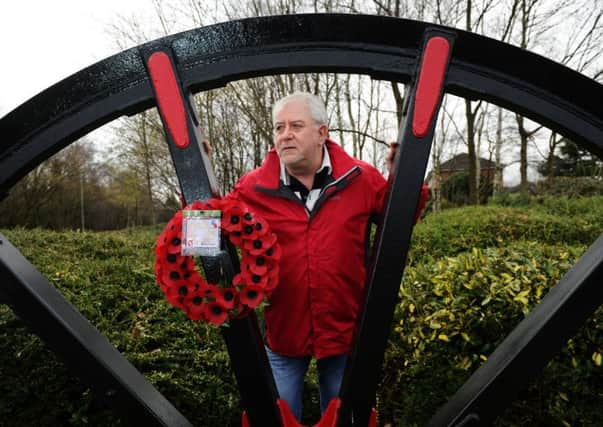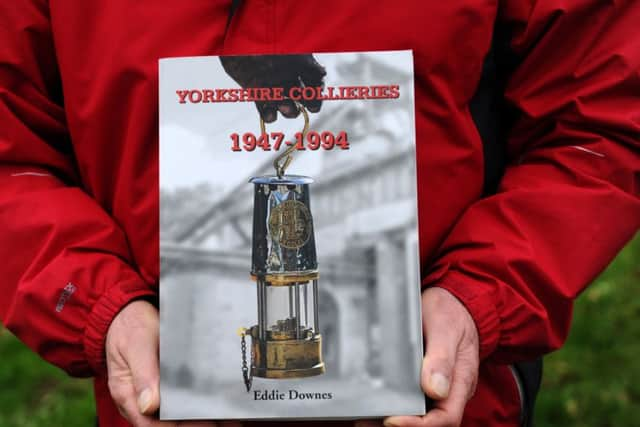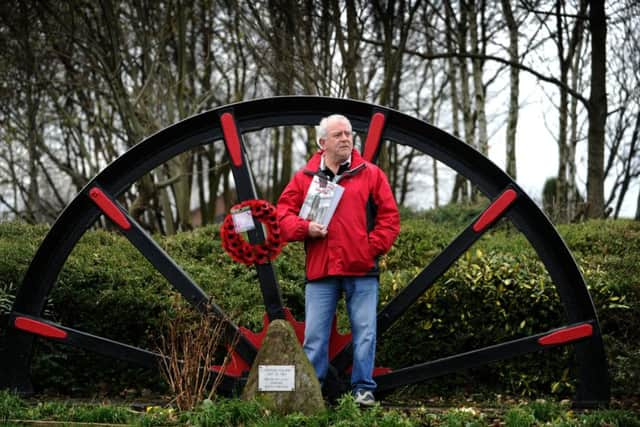A Mine of History: Former miner Eddie Downes writes first comprehensive history of nationalised Yorkshire mines


Eddie Downes is telling me about the time he was almost ‘caught out’ underground. When he says ‘caught out’, though, what he really means is killed.
As a miner, he has spent long years of his life in the maze of shafts and tunnels which run beneath the landscape of Yorkshire (and beyond), having worked in over 120 mines during his career. He’s even worked abroad in the US, Canada, Spain and Germany.
Advertisement
Hide AdAdvertisement
Hide AdHis career down the pit began with a chance encounter in a pub when he was 22, but it wasn’t the profession he chose after leaving school with seven O Levels and four A Levels.


“After 15 years of school, I’d had enough,” explains Eddie, 66, who is now retired and has just written Yorkshire Collieries 1947-1994, an extensive 680 page tome, which chronicles the history of mining in the county. “So I went to become a labourer in a brickyard, I loved it. I was in a local pub one night having a drink and got talking to a chap who was Personnel Manager at a local pit. He offered me a job and I ended up taking it.”
The job was at Frickley Colliery, South Elmsall and taking it made Eddie a fourth generation miner, following his father, grandfathers and great grandfathers before him.
“It wasn’t something my dad wanted for me but I thought I would give it a whirl. I wanted to be colliery manager some day but to do that I had to learn every job, which is what I set about doing, starting as a basic underground worker but in the meantime, I also went to college on day release, then block release, finally obtaining a degree in Mining Engineering at Leeds University. At the pit I did well too, becoming a Junior Official and then Undermanager in 1980 but it got to the stage where I realised I wasn’t going to progress any further. So, I ended up leaving. After three years as Undermanager, I realised I could be doing that job for another 20 years. At that time, you only got promoted when somebody died, or if you had friends in high places. It was the same when you signed on at the pit. If anyone in your family worked there, no matter how distant a relative, you could get a job down the mine.
Advertisement
Hide AdAdvertisement
Hide Ad“After I left the NCB - so, between the years 1983 and 1991 - I worked for a number of companies who did work for the National Coal Board (NCB) but then in 1991, I formed my own company with my wife, Janet, which was called E&J Mining Ltd. We specialised in putting out underground fires and filling large voids underground.


“Fires are common underground in mines. They are caused by mining, because you introduce air to the coal, which is under pressure. I’ve seen one fire where flames came into the tunnel. The flames were quickly extinguished.”
“I helped put out the Rossington Fire [in Doncaster] in December of 1984, during the Miners’ Strike, it was touch and go as to whether they lost the pit or not. They called us in, we had to go through a large picket line of striking miners. The job took six hours but the NCB kept up the pretence for several days. They paid my men to be there just to try and break the strike. This effort failed. They said if you do this, we will give you a lot of work after the strike and they did. They gave us about £250,000 worth.”
Mr Downes has kept his book non-political, giving both the NCB and National Union of Miners due credit but in his preface he notes: “What was meant to chart the proud history of the Nationalised Yorkshire Pits was in fact recording the demise of a great industry, its communities and way of life.” As an ex-miner, he has his own views on the strike. “The 1984-85 Miners Strike, engineered by Margaret Thatcher, pitted miner against miner in a battle to preserve pits and jobs. The failure to organise a proper ballot played into the Government’s hands and it became obvious in March 1987, when the British Coal Corporation was formed, that the industry was to be sold off and privatised. I remember the strike of ‘74, which brought down the Heath government. That strike was purely about getting a decent living wage. The week before the strike, we were on £17 a week, the week after we were on £35. In 1984-85, Margaret Thatcher knew what she was doing when she took on the Miners Union, by announcing the closure of Cortonwood, Polmaise and Snowdown collieries - key pits in the most militant areas. Mrs Thatcher played her cards perfectly. The fact the union never had a proper ballot was their undoing.”
Advertisement
Hide AdAdvertisement
Hide AdStill, he’s sad that mining has ended for good in Britain. The deathknell for deep mining in England sounded in 2015 with the closure of Kellingley Colliery, which could no longer compete with cheaper imports. Mr Downes was instrumental in helping raise money for a new memorial to commemorate the 361 men and boys who lost their lives during the Oaks Colliery disaster in 1866. More than £100,000 has been raised and a memorial is due to be unveiled on May 7. So, what about that near death incident?


“It was at Frickley in 1982 with a team, working on an underground fire. The conditions were so bad we required a Rescue Man and a canary. When the Rescue Man needed a break, I said, ‘Okay, but leave the bird.’ About two minutes later, the bird just dropped off the perch. We stopped work immediately and began running towards fresh air, taking the bird, because we knew the gas was following us. We ran for about a thousand yards up hill. If that bird hadn’t fallen from its perch, we’d be dead.
“In the end, we found out that someone in an adjoining tunnel had left some ventilation doors open, which reversed the air flow in the tunnel and because there was a fire underground, carbon monoxide gas was produced.”
And what about the canary?
“It came round when we were about 30 yards up the tunnel. It was fine.”


FACTFILE
The book has taken almost a decade to research and write
Advertisement
Hide AdAdvertisement
Hide AdSome of the proceeds from the book, which costs £25, will be donated to the Oaks Memorial Fund
The book is available from the National Coal Mining Museum, Barnsley Museum and from the Old Barnsley Shop in ‘The Yellow Shed’, Barnsley and by emailing Mr Downes direct
Contact Mr Downes on email at: [email protected]
Or telephone him on 07958 331 262